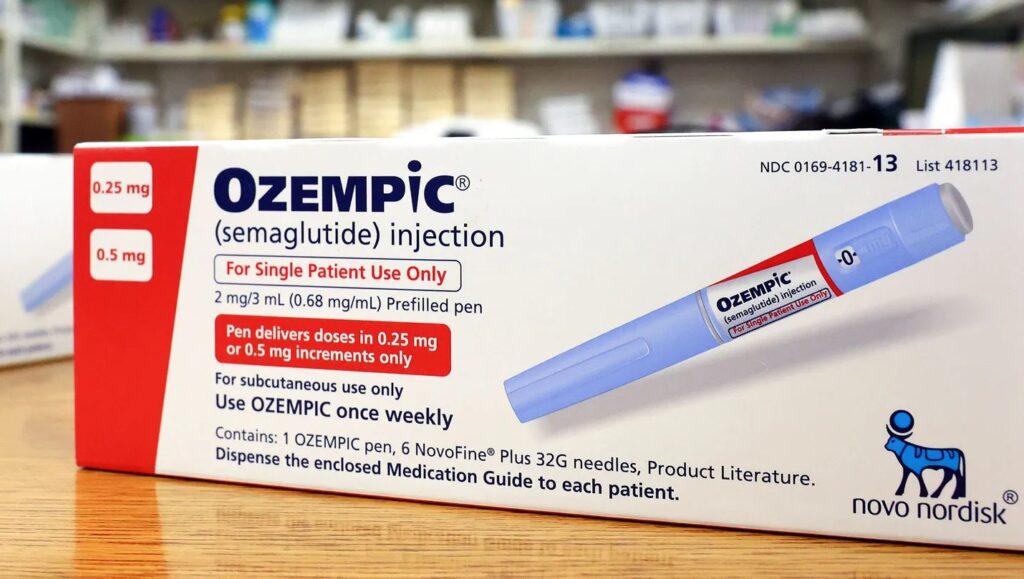25/05/2024
25/05/2024

STOCKHOLM, Sweden, May 25: Semaglutide, the active ingredient in the popular medications Ozempic and Wegovy, has been shown to significantly reduce the risk of kidney complications, heart issues, and death in individuals with Type 2 diabetes and chronic kidney disease, according to a major clinical trial published on Friday. These groundbreaking findings have the potential to revolutionize treatment protocols for some of the most severely affected patients with chronic kidney disease, a condition that impacts more than one in seven adults in the United States and currently has no cure.
Dr. Katherine Tuttle, a professor of medicine at the University of Washington School of Medicine and an author of the study, expressed her excitement over the results. “Those of us who really care about kidney patients spent our whole careers wanting something better. And this is as good as it gets,” she stated. The research was unveiled at a European Renal Association meeting in Stockholm and concurrently published in The New England Journal of Medicine.
The trial, funded by Novo Nordisk, the manufacturer of Ozempic, was so successful that the company decided to halt it early. Dr. Martin Holst Lange, Novo Nordisk’s executive vice president of development, announced plans to seek FDA approval to update Ozempic’s labeling to include its benefits in slowing the progression of chronic kidney disease and complications in people with Type 2 diabetes.
Diabetes is a primary cause of chronic kidney disease, which occurs when the kidneys fail to function adequately. In advanced stages, the kidneys are so damaged that they cannot effectively filter blood, leading to fluid and waste accumulation, exacerbating high blood pressure, and increasing the risk of heart disease and stroke, explained Dr. Subramaniam Pennathur, chief of the nephrology division at Michigan Medicine.
The study involved 3,533 participants with both kidney disease and Type 2 diabetes, half of whom received a weekly injection of semaglutide, while the other half received a placebo. Over a median follow-up period of approximately three and a half years, the results revealed a 24 percent reduction in major kidney disease events among those who took semaglutide. Specifically, there were 331 such events in the semaglutide group compared to 410 in the placebo group.
Participants receiving semaglutide also exhibited lower mortality rates from cardiovascular issues and overall causes, alongside slower kidney function decline. This is significant because kidney damage typically progresses gradually and remains asymptomatic until advanced stages, as noted by Dr. Melanie Hoenig, a nephrologist at Beth Israel Deaconess Medical Center, who was not involved in the study.
The severity of the participants' conditions underscores the importance of these findings. Most were already undergoing treatment for chronic kidney disease, which often necessitates dialysis or kidney transplants in its later stages, said Dr. George Bakris, a professor of medicine at the University of Chicago Medicine and another study author.
The promising results are particularly relevant for patients with advanced kidney disease. “We can help people live longer,” emphasized Dr. Vlado Perkovic, a nephrologist and renal researcher at the University of New South Wales, Sydney, and another study author.
Despite the clear benefits, researchers acknowledge uncertainties about the mechanisms through which semaglutide aids the kidneys. One hypothesis suggests it may reduce inflammation, a contributing factor to kidney disease progression.
The study's limitations include a predominantly male (two-thirds) and white (two-thirds) participant pool, even though chronic kidney disease disproportionately affects Black and Indigenous populations. Additionally, gastrointestinal issues, a common side effect of Ozempic, led some participants to discontinue the drug.
Doctors are also curious about semaglutide's potential benefits for patients with kidney disease but without diabetes, as well as its long-term risks. However, the recent data reinforce that semaglutide's applications extend beyond diabetes management and weight loss. The FDA approved Wegovy in March for reducing cardiovascular risks in certain patients, and ongoing research is investigating semaglutide and tirzepatide (found in Mounjaro and Zepbound) for conditions like sleep apnea and liver disease.
If the FDA approves this new use, it could further increase demand for Ozempic, which has already experienced supply shortages. “I think it’s a game changer,” Dr. Hoenig remarked, “if I can get it for my patients.”


